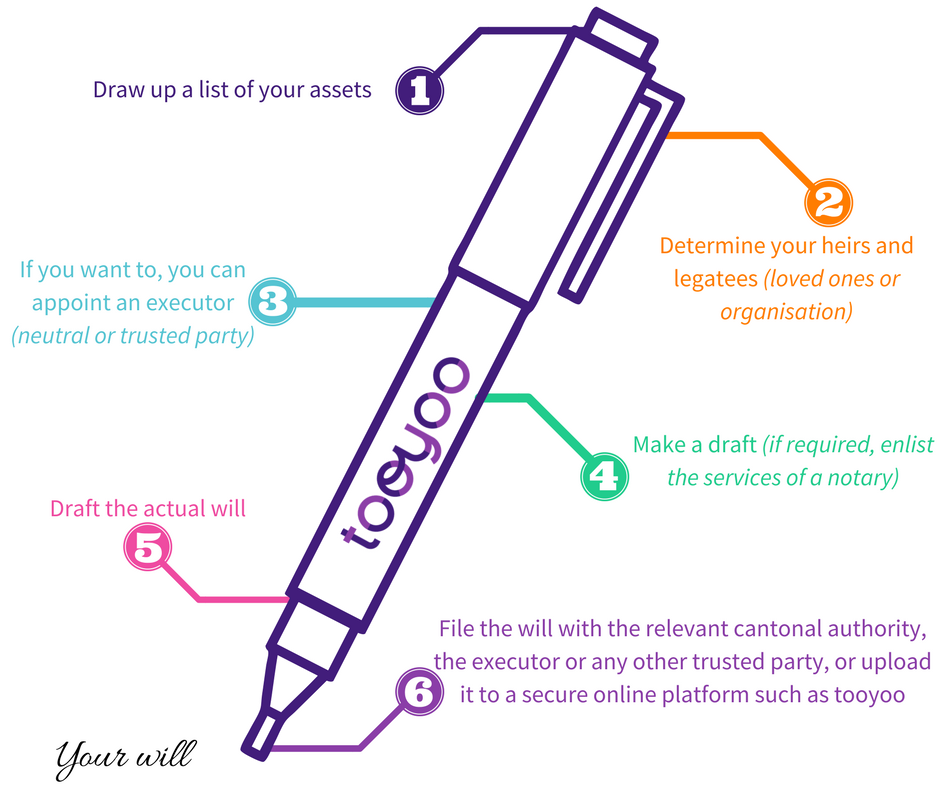Making a will

Some people have already given serious thought to making a will. For others, the idea will seem new. This article aims to guide and inform you about the essentials. Drafting a will is not an easy task and there are rules to follow. However, it is a vital document for protecting your family and ensuring that your final wishes for your estate are respected in cases where the law is silent.

What is a will? A will is a legal transaction by which a person states their final wishes and disposes of their property for the time following their death. In addition to assets, a will can also appoint an executor.
Any person of full age with a capacity to make rational decisions may draw up a will. People who are visually impaired or unable to draw up a holographic will must engage the services of a notary.
A couple – even a married couple – cannot make a joint will: wills must be made individually. If two people in a couple wish to organise passing on their estate at the same time, a contract of inheritance is advised. A contract of inheritance is also recommended when people wish to grant each other reciprocal gifts without the possibility of revoking them - for example, between spouses. Another example is where a person voluntarily renounces their reserved portion of a deceased person’s estate.
Establish your testament simply and for free on tooyoo.
Types of will
There are three different types of will.
Holographic wills
You can draw up a holographic will yourself, at any time, without a notary or a witness being present. For a will to be legally valid, only a handful of conditions must be fulfilled:
- It must be entirely handwritten by the testator.
- It must be dated (day, month and year) and the place of writing must be indicated.
- It must be signed.
If any of these three items is missing, the will shall be considered null and void. Every effort should be made for the will to be legible.
It is strongly recommended that you deposit your will with a public official or notary for safekeeping. Otherwise, it could be misplaced or may become lost. You can also digitally share a will with your trusted relatives and indicate where the original is stored. After having written a will, the most important thing is that it is found when the time has arrived.
Public wills
A public will is a will made before a notary and two witnesses. The testator dictates his or her wishes to the notary, who then draws up the will and keeps it safe. The notary can provide advice and check the enforceability of the testator’s wishes. The witnesses testify to the testator's capacity to make rational decisions. Public wills are useful in complex cases involving for example step-families, business successions or multi-country estates. This type of will is the most difficult to contest.
Oral wills
This type of will is only used if a person is about to pass away. The final wishes must be expressed to two witnesses, who then must deliver a document to a judicial authority citing the date, the circumstances in which the will was made, and adding their signatures.
Wills recorded in video form or typewritten on a computer are not admissible. Photocopies do not have legal force.
Why make a will?
You should make a will because it is the only way to ensure that your final wishes are respected. A will lays down your chosen rules of inheritance, thus dispelling any doubts. In addition, where there is no will, property is divided up according to legal provisions. If you have no direct descendants or surviving spouse, the estate falls to distant relatives or, failing that, to the state. Wills are vital in cases of cohabitation or if your partner is not registered as such, because unless you have made a will, your partner will have no rights. If you want to bequeath to someone close but to whom you are not related, a will is mandatory. This also applies to bequests to good causes.
The contents of a will
What property is included?
All the assets that belong to you personally: objects (jewellery, collections), movable property (furniture, vehicles, paintings, etc.) and immovable property (houses, apartments, land, etc.).
Layout
When making a will, it is necessary to be as clear as possible in order to avoid fostering doubts and leaving room for interpretation.
Every will should have the following:
- An unambiguous title: “will” or “last will and testament”
- First name and surname, date of birth, place of origin/nationality and address of testator
- The precise names of heirs or legatees (name, surname, date of birth, address, relationship) and the division of assets
- Clear sentences should be formulated, drawing a distinction between heirs and legatees. Otherwise the will could be challenged
- The actual provisions
- It is also advisable to indicate net amounts to avoid any tax-related issues
You can also be guided by our wizard to help you write your will.
Respecting the rules of transfer
First, it is important to distinguish between a legacy and the naming of an heir. Heirs and legatees do not have the same legal footing. A legacy allows a person or institution to receive a sum of money from a person's estate without having to name the recipient as an heir. Unlike heirs, the beneficiary of such a bequest is not liable for the deceased person's debts
The reserved portion of the estate, i.e. the indefeasible portion that must go to the forced heirs (next-of-kin, namely children, a surviving spouse or a registered partner), must be respected. Where there are no descendants, the deceased person's parents are also entitled to a portion of the forced estate. Once the reserved portion of the estate has been deducted from your assets, you are left with the discretionary portion, i.e. the portion of the estate you are free to bequeath to whomever you choose. This portion usually represents at least one-quarter of the assets. If you do not have an intestate heir, you can bequeath all your assets by will to a person or an institution.
A will does not become invalid if it infringes on the reserved portion. However, the forced heirs have the right to contest this division and demand their share of the inheritance. If lawful, you can express any particular wishes or desires in your will.
If you wish to understand your personal situation and how your inheritance is distributed according to the law, you can play with the scenarios in our will creation wizard.
Disinheriting someone must be exceptional. To do so, you must justify the person's insolvency or misconduct towards your family.
Can a will be amended? If you want to amend your will, it is better to create an appendix than cross out and add new information to an existing will. For major changes, you may redraft a will and revoke the old one.
Is a will always necessary? A will is restrictive because it must comply with a certain number of rules to be valid. Many provisions are already regulated by law, so a will is not always necessary. Expressing one's last wishes in other ways can also have legal force. For example, you may simply want to draft a document and share it with your loved ones, or record your wishes on a digital platform such as tooyoo. Unless heirs are contested, the wishes expressed in other forms are valid within the meaning of the law and taken into account by professionals dealing with arrangements towards the end of a person’s life and after they have passed away.
tooyoo is offering an entirely new way of making a will. With our platform, you will be coached at every stage. We've already thought about the questions – you simply have to answer them. You can also easily modify your answers at any time. On tooyoo you will find topics you might not have thought of, such as passwords for your social media accounts, computer and even your subscriptions. With tooyoo all your key information is housed in one place. You can also communicate your wishes regarding organ donation and funerals in advance to your loved ones. In contrast, a will is only opened once the burial has taken place.
or